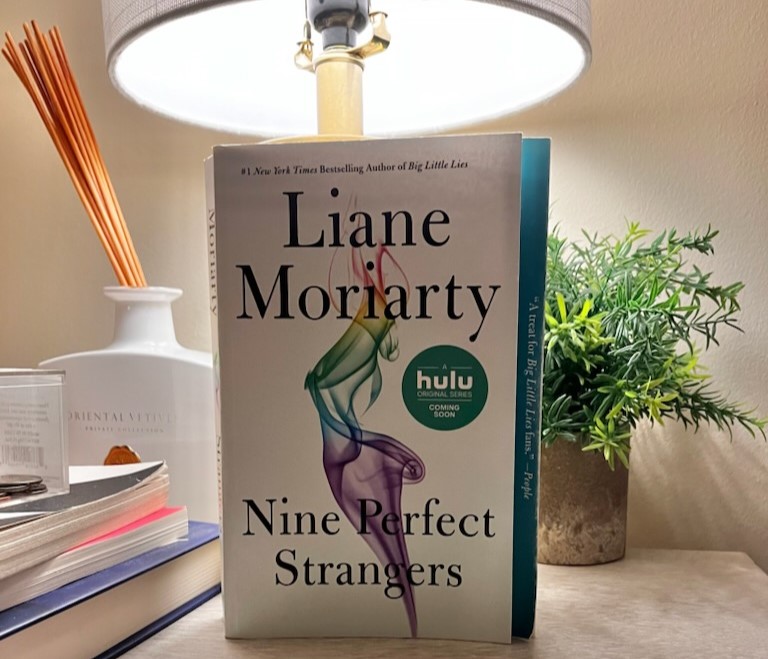Nine people, sunken to the lowest points of their lives and seeking a fresh start, meet at a health resort, hoping to turn things around. To some, it is a break, a reprieve from the harsh realities and recent tragedies that have befallen them. To others, it is an opportunity to reinvent and rebuild. It is a chance to leave tragedy and hopelessness behind.
Namaste, and welcome to the Tranquillum House, where a new you awaits.
“Nine Perfect Strangers” by Liane Moriarty is labeled as a psychological thriller. As its name implies, the novel follows the story of nine strangers encountering each other at a health resort, before meeting their slightly overzealous resort instructor, a woman named Masha.
During the present reality at the Tranquillum House, Masha is introduced as an incredibly athletic, healthy, practically glowing woman who obsesses over her “rebirth.” Previously, she was a struggling, unhealthy corporate CEO, who, after suffering a heart attack and deciding to quit her job, was transformed into the person she is now.
And that is the essence of the Tranquillum House – it is meant to be a transformative experience. It seems impossible to pull a person from the lowest point in their life and to place them on a pedestal, recovered and ready to start anew.
During the first half of the resort, when Masha is still somewhat sane and taking care of her guests, it all seems like a nice break for the characters, yet nothing has changed within them. Author Frances still despairs over a poor critic review, ex-athlete Tony still struggles with his career-sustained injuries, and the Marconi family of three still dream of their lost member. Perhaps this is an example of why simple health resorts cannot work. Without taking drastic measures, nothing will change.
All of a sudden, Masha loses her mind, and the guests end up locked in a basement while the house appears to be burning. Given Masha’s obsession with her rebirth and its cause, a reader would have expected one of the resort guests to have a near-death experience to truly trigger a “rebirth”, but no character was ever in real mortal danger.
I believe the trauma of Masha’s hospitalization coupled with a conversation with an older woman triggered Masha’s rebirth. The overall emotional impact of waking up in a hospital bed after suffering a heart attack is more drastic than that of smelling some smoke, panicking, before opening a door and realizing that nothing is really on fire. Masha’s experience of an extended period of unconsciousness and near death, coupled with the sensation of reliving birth and waking up in a hospital bed, may have solidified Masha’s belief that she was truly reborn.
However, Masha did not experience this relief, and her more drastic experiences led to her more drastic changes. Still, she has not forgotten her past life, and she still suffers from recalling her past tragedies. There is no “rebirth”, no full “renewal” – there is simply moving forward, and changing your future path.
Coming from a dump of misery, tragedy and self-loathing, characters suddenly opening their hearts and embracing the future gives the reader a fluffy, optimistic, wholesome feeling. It gives the reader hope that no matter how old you are, where you are in life, there is always a way to move on, and there are always new chapters in your life to reach.
Sure, the message might be a little cheesy, a little too happy-go-lucky, but it goes much deeper than simple optimism. Rather than only inspiring hope in its readers by having its struggling characters suddenly find their happy endings, the novel also presents an argument, an answer to a question.
A quote from comedian George Carlin opens the book: “Just when I discovered the meaning of life, they changed it.”
To me, the story presents their version of said meaning: it is to fall, over and over again, and to move forward, because that is life. Anyone can stop the journey, as the son of Marconis did, but to kill oneself is to give up on that meaning. We continue life to find that cheesy, corny happy ending, and that hope is often what keeps people going during the lowest periods of their lives. That, I believe, is what “Nine Perfect Strangers” is trying to say – that this constant search for happiness is their meaning.


















![“[Building nerf blasters] became this outlet of creativity for me that hasn't been matched by anything else. The process [of] making a build complete to your desire is such a painstakingly difficult process, but I've had to learn from [the skills needed from] soldering to proper painting. There's so many different options for everything, if you think about it, it exists. The best part is [that] if it doesn't exist, you can build it yourself," Ishaan Parate said.](https://harkeraquila.com/wp-content/uploads/2022/08/DSC_8149-900x604.jpg)




![“When I came into high school, I was ready to be a follower. But DECA was a game changer for me. It helped me overcome my fear of public speaking, and it's played such a major role in who I've become today. To be able to successfully lead a chapter of 150 students, an officer team and be one of the upperclassmen I once really admired is something I'm [really] proud of,” Anvitha Tummala ('21) said.](https://harkeraquila.com/wp-content/uploads/2021/07/Screen-Shot-2021-07-25-at-9.50.05-AM-900x594.png)







![“I think getting up in the morning and having a sense of purpose [is exciting]. I think without a certain amount of drive, life is kind of obsolete and mundane, and I think having that every single day is what makes each day unique and kind of makes life exciting,” Neymika Jain (12) said.](https://harkeraquila.com/wp-content/uploads/2017/06/Screen-Shot-2017-06-03-at-4.54.16-PM.png)








![“My slogan is ‘slow feet, don’t eat, and I’m hungry.’ You need to run fast to get where you are–you aren't going to get those championships if you aren't fast,” Angel Cervantes (12) said. “I want to do well in school on my tests and in track and win championships for my team. I live by that, [and] I can do that anywhere: in the classroom or on the field.”](https://harkeraquila.com/wp-content/uploads/2018/06/DSC5146-900x601.jpg)
![“[Volleyball has] taught me how to fall correctly, and another thing it taught is that you don’t have to be the best at something to be good at it. If you just hit the ball in a smart way, then it still scores points and you’re good at it. You could be a background player and still make a much bigger impact on the team than you would think,” Anya Gert (’20) said.](https://harkeraquila.com/wp-content/uploads/2020/06/AnnaGert_JinTuan_HoHPhotoEdited-600x900.jpeg)

![“I'm not nearly there yet, but [my confidence has] definitely been getting better since I was pretty shy and timid coming into Harker my freshman year. I know that there's a lot of people that are really confident in what they do, and I really admire them. Everyone's so driven and that has really pushed me to kind of try to find my own place in high school and be more confident,” Alyssa Huang (’20) said.](https://harkeraquila.com/wp-content/uploads/2020/06/AlyssaHuang_EmilyChen_HoHPhoto-900x749.jpeg)




